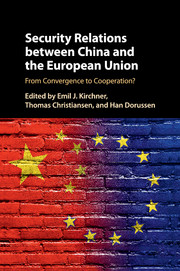Book contents
- Frontmatter
- Dedication
- Contents
- List of Tables
- Preface and Acknowledgements
- Abbreviations
- List of Contributors
- 1 EU–China Security Cooperation in Context
- 2 Chinese and EU Views of Military Security: Crafting Cooperation
- 3 Regional Solutions for Regional Confl icts? The EU, China and their Respective Neighborhoods
- 4 Aims versus Deeds: EU–China Cooperation in Nuclear Nonproliferation
- 5 Terrorism and Organized Crime: Common Concerns but Different Interests
- 6 Chinese and EU Climate and Energy Security Policy
- 7 Competing or Converging Claims on International Order? The EU, China and Human Security
- 8 Civil Protection: Identifying Opportunities for Collaboration
- 9 Cybersecurity and EU–China Relations
- 10 The Economic Security Dimension of the EU–China Relationship: Puzzles and Prospects
- 11 Is Securitizing Migration a Mandatory Choice? Lessons from the EU and China
- 12 Against the Odds: (Considerable) Convergence and (Limited) Cooperation in EU–China Security Relations
- Index
- References
12 - Against the Odds: (Considerable) Convergence and (Limited) Cooperation in EU–China Security Relations
Published online by Cambridge University Press: 05 September 2016
- Frontmatter
- Dedication
- Contents
- List of Tables
- Preface and Acknowledgements
- Abbreviations
- List of Contributors
- 1 EU–China Security Cooperation in Context
- 2 Chinese and EU Views of Military Security: Crafting Cooperation
- 3 Regional Solutions for Regional Confl icts? The EU, China and their Respective Neighborhoods
- 4 Aims versus Deeds: EU–China Cooperation in Nuclear Nonproliferation
- 5 Terrorism and Organized Crime: Common Concerns but Different Interests
- 6 Chinese and EU Climate and Energy Security Policy
- 7 Competing or Converging Claims on International Order? The EU, China and Human Security
- 8 Civil Protection: Identifying Opportunities for Collaboration
- 9 Cybersecurity and EU–China Relations
- 10 The Economic Security Dimension of the EU–China Relationship: Puzzles and Prospects
- 11 Is Securitizing Migration a Mandatory Choice? Lessons from the EU and China
- 12 Against the Odds: (Considerable) Convergence and (Limited) Cooperation in EU–China Security Relations
- Index
- References
Summary
The ambition in producing this volume was to examine the nature and extent of relations between the European Union and China beyond the scope of trade and investment. While there is no doubt that this relationship continues to be dominated by economic concerns, the preceding chapters have demonstrated the multifaceted character of the cooperation between the two powers and the value in probing deeper into the various security dimensions of this relationship.
Seeking to identify a security perspective in the context of a predominantly economic partnership is not a contradiction. Indeed, these two aspects of EU–China relations can be seen as two sides of the same coin: precisely because the EU and China are such significant trading partners, both also have an inherent interest in various kinds of cooperation that can help to underpin their mutual security (Gartzke 2007). Or, to put it differently, the fact that Europe and China perceive each other as trading partners – and not as adversaries – also makes it easier to consider cooperation across a range of security domains.
From such a starting point, EU–China security cooperation is not a utopian concept or a normative agenda, but an empirical question – a question that requires the kind of detailed analysis across a range of relevant areas that the contributions to this volume have provided. Building on these foundations, the purpose of this concluding chapter is threefold. First, to bring together the individual analyses and aggregate them, as much as possible, into a comprehensive picture. Second, the wider context influencing EU–China security relations will be brought into focus, including issues such as the potential for differences among EU member states and the role of third countries as impacting on this relationship in the context of global security. Finally, based on the preceding analysis and discussion, the chapter will provide an overall assessment of the current state and future prospects of EU–China security relations.
Security Cooperation between the EU and China – Toward Convergence?
The contributions to this volume have systematically analyzed EU–China security relations across a range of traditional and nontraditional dimensions of security. The guiding questions, as established in our introductory chapter, concerned the degree to which one can observe convergence between the two sides with respect to both the perceptions of threats facing the polity/society as well as the domestic policy response in addressing such threats.
- Type
- Chapter
- Information
- Security Relations between China and the European UnionFrom Convergence to Cooperation?, pp. 229 - 247Publisher: Cambridge University PressPrint publication year: 2016
References
- 4
- Cited by



